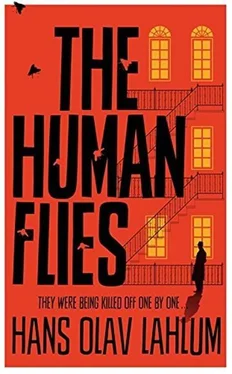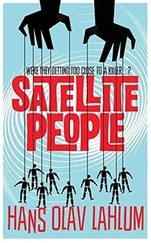‘Excellent. Eleven o’clock precisely it is. For reasons that will become apparent, we will have to meet here at my home, but I would be happy to send a car for you should that be necessary.’
I replied politely that it would not be necessary, double-checked that the address was still 104-8 Erling Skjalgsson’s Street and promised to be there at eleven precisely.
As expected, the newspapers had a much bigger spread about the case today. They all carried photographs of 25 Krebs’ Street, and most of them had old wartime pictures of Harald Olesen on the front page. The headlines varied from ‘Resistance Hero Murdered in His Own Home’ to ‘Unsolvable Murder Mystery in Krebs’ Street’. The name of the detective inspector leading the investigation was fortunately mentioned in favourable terms à la ‘apparently very capable young detective’. One of them had even included the fact that I was known as ‘K2’ among my younger colleagues and that I was said to be a man who could deal with major challenges and dizzying heights.
The newspapers made depressing reading for the remaining residents of 25 Krebs’ Street. The deceased’s neighbours remained anonymous, but the address and photographs would make it easy enough for anyone interested to identify them. The papers would be disheartening reading for Konrad Jensen in particular. Several of them carried the news that the residents of 25 Krebs’ Street included a previously convicted Nazi. No one gave his name. One of the main newspapers did, however, mention that the previously convicted Nazi now worked as a taxi driver – and printed a photograph of his parked car.
Harald Olesen’s nephew and niece were in their forties and gave an immediate impression of prosperity and reliability when they came into my office at nine o’clock. The niece, who was tall and blonde, was called Cecilia Olesen and worked as an office manager for the Oslo Cooperative Housing Association. Her brother was the same height, somewhat darker and more serious. With regard to his civil status, Joachim Olesen said that he was married and had two children under school age. His sister had been married and had a daughter, but had taken back her maiden name following a divorce. The niece and nephew both said that they had had good, if sporadic, contact with their uncle. He had withdrawn somewhat following the death of his wife, but still had relatively regular contact with the family. He had spoken very little about the other residents in the building.
The niece and nephew were also both of the opinion that Harald Olesen had been downcast of late, but believed that this had a natural, medical explanation. After a Christmas party the year before, he had told them that he had been diagnosed with cancer and may not live to see next Christmas. So the news of his death was not entirely unexpected, though obviously the circumstances had been a shock, and a blow to the whole family.
The niece and nephew had both understood without anything having been said that they were his closest relatives and could therefore expect a substantial inheritance. They had, however, never wished to ask about it, and he had not said anything explicit. He had inherited a large amount of money from his father and had never been a big spender, despite earning well for many years himself. The family therefore had reason to believe that he was a very wealthy man. They had only received a short and businesslike message from their uncle’s lawyer stating that in accordance with the deceased’s wishes, the will would be read at the law firm’s offices six days after his death, more specifically on Wednesday, 10 April at midday.
I made a note about the cancer, which was the most important new piece of information from the niece and nephew. The other important piece of information was that Harald Olesen had the year before asked for the family’s permission to work on his own biography. This was prompted by a request from a young history student by the name of Bjørn Erik Svendsen. Without prying too much, the niece and nephew had later understood that the book was underway and that Harald Olesen had had several open-hearted conversations with his biographer and also given him access to parts of his archive.
The niece and nephew had nothing more of any relevance to tell. I said goodbye to them around ten and promised to inform them as soon as there was anything new to report in connection with the murder investigation. The history student Bjørn Erik Svendsen was added to the top of my list of people to contact as soon as possible. It struck me as odd that I still had not heard from him two days after the murder. Fortunately, this little mystery was quickly cleared. It transpired that a message from a woman who had called as she absolutely had to talk to me was from a certain Hanne Line Svendsen, and she was Bjørn Erik Svendsen’s mother. She said that her son had gone to an international socialist youth conference in Rome, but had been informed of the murder by telephone and telegram. He was expected home late on Sunday evening and would come to the police station first thing on Monday morning. Bjørn Erik Svendsen had said, on a very bad line from Rome, that it was possible that he had some important information about Harald Olesen’s early life and would of course make this available to the investigation. I reluctantly accepted the news that Mr Bjørn Erik Svendsen could not be contacted before Monday morning. I tried to see it as positive that new information regarding Harald Olesen was on its way to Norway.
In the meantime, I called the law firm Rønning, Rønning & Rønning. The Rønning I needed to speak to, Edvard Rønning Junior, was unfortunately not in the office. According to his secretary, he had flown to West Berlin a couple of days earlier. The secretary apologized and sheepishly explained that there were ‘several indications’ that Rønning Junior was going to meet one or more personal friends in Central Europe, but no one knew where he was going from the airport. When he had called the office about another case on the Friday morning, he had of course been informed of Harald Olesen’s death. Rønning Junior had immediately explained that Olesen’s will had recently been ‘reworded’ and, in accordance with the explicit wishes of the deceased, would be announced six days after his death.
Rønning Junior had promised that he would personally be present to read out the will in the law firm’s offices at midday on Wednesday, 10 April. He would send a telegram ‘as soon as possible’ with a short list of the people the deceased wished to be present at the reading of the will. If the police contacted the firm, he had asked that they be informed that the most recent version of the will was responsibly secured, that all the formalities were in place and that we were welcome to come to the reading of the will on Wednesday. He had then said that he had to ‘rush to an extremely important meeting’ and hung up. Unfortunately, the will was not to be found in his office, and the telegram had not arrived yet. Thus the firm could only apologize that they could not be of any further help in the investigation. Rønning Junior was ‘an exceptionally talented young lawyer, and rigorous with regard to formalities and discretion on behalf of his clients’, the secretary concluded apologetically. I had no problem in believing her, and saw little option other than to ask Rønning Junior to contact me immediately if anyone should speak to him before Wednesday morning.
Harald Olesen’s doctor was still on sick leave, but was willing to answer questions on his private phone. Having tussled briefly with his conscience, he felt that he could make a pragmatic exception to patient confidentiality, vis-à-vis the police, with regard to a patient who was in fact already dead, as was the case. He then confirmed that Olesen had been diagnosed with bowel cancer about a year ago. This had spread more rapidly than expected in recent months and Olesen had been told in December that the end might be only a matter of months away. Olesen had received this news with admirable dignity. He had remained seated, pensive, and then said that he had some important issues to consider and sort out before it was too late. The doctor thought this was quite a natural reaction and had not enquired as to what these might be.
Читать дальше











